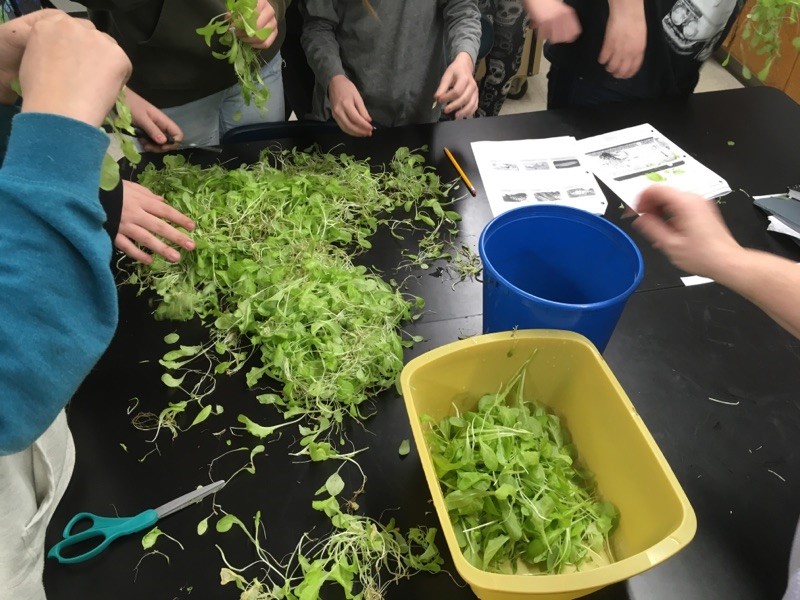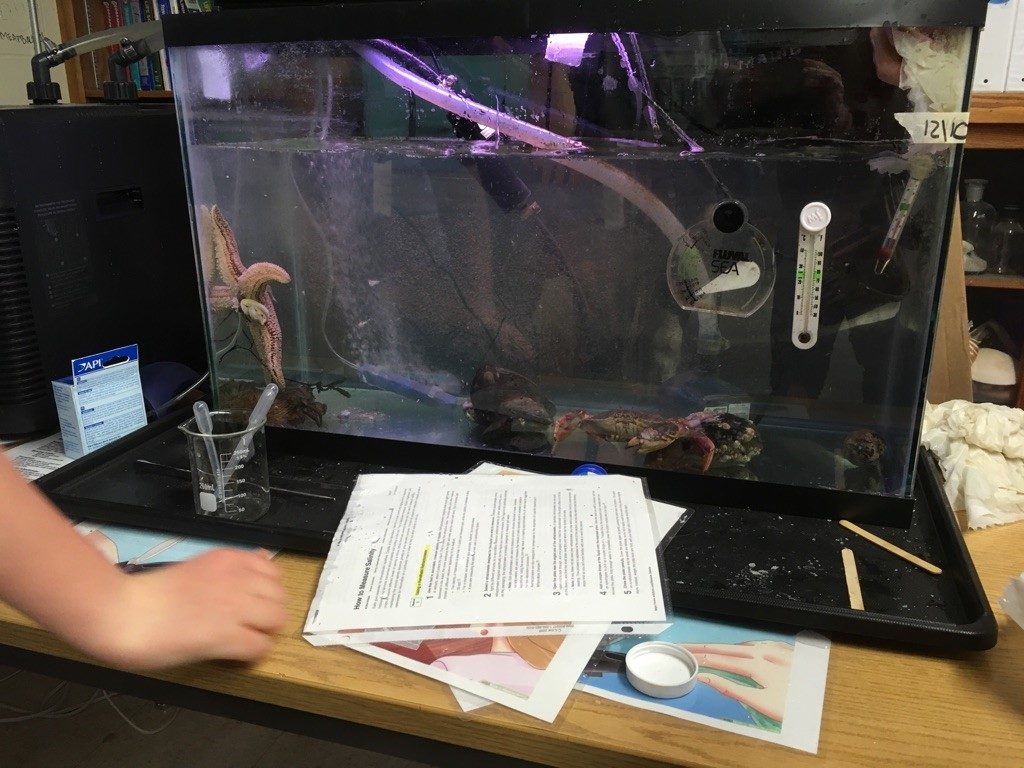Boothbay’s Educator in Residence: Ella
In my years as a student I have never seen an entire school of teachers so collectively invested in their students well being. The Boothbay staff are incredibly dedicated to their students. I was impressed and inspired by how passionate they are about their jobs. They are a team that use one another for support, resources, and insight. Boothbay is a small town where everybody knows everybody. There are many former students that now have children of their own being taught by the same teachers they grew up with. This school feels like a family and I feel incredibly lucky to be apart of their unit.
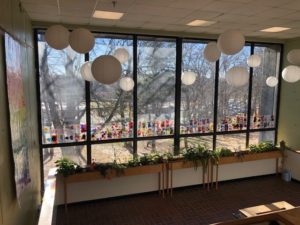
I get the opportunity to work with students pre-k through 8th grade. My main focus being on creating a sense of support and empathy between the 7th and 8th grade. I was “the new kid in school” to the 7th and 8th graders that have spent the majority of their years in the same school since kindergarten. Through trial and error during activities and lack of understanding what my purpose is in their school; the students began to change their tune. I’ve learned with the older middle school students want more choices and they don’t get many opportunities to choose much of anything for themselves at that age. Giving them options during activities, space to voice their ideas and concerns got them invested in their time with me. They became excited for me to come during their study hall time. They reach out to me as a resource as well as the teachers. When I’m not running activities or mentoring students I am the “bandaid women” who can fill in for teachers, give a helping hand or offer a child a break if they are struggling in class.
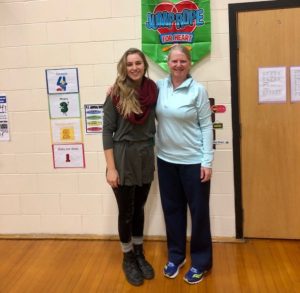
I think there is an incredible amount of value in having an educator in residence. A teacher that isn’t pushed by testing standards and mandatory curriculum has much more time to focus on each individual student.
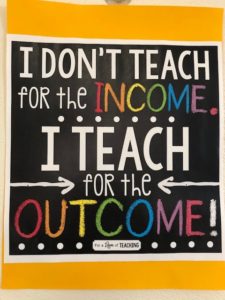
During The Leadership School there is a weekly rotation of students who come through our program. It’s a more meaningful experience to form connections with your students overtime and get to see the light bulb come on. Getting to witness them grow from week to week is so rewarding as a teacher. Recognizing the changes in my students makes my job worthwhile. Knowing that I’ve made a positive difference in a child’s life brings me an immense amount of joy and while not all days are rainbows and sunshine, I wouldn’t trade this opportunity for anything.
Whitefield’s Educator in Residence: Nina
The winter of 2019 marks my second year working at the Whitefield school. A small school, Whtiefield Elementary sits 20 minutes east of Augusta, serving around 170 students, pre-k through 8th grade. Since I’ve been gone, some very exciting experiential developments have occured in the Science/Social Studies classroom where I do most of my EIR! The aquaponics table has produced bountiful lettuce and there is a saltwater tank home to a couple crabs, sea stars, and mussels. I’ve been reviewing and trying out some new labs with the 7th grade, the homeroom of the science classroom, that reflect the ecosystems sitting in the back of their room. Recently, I had the pleasure of sifting through a giant rock box and working with my site mentor to take the 6th graders through geologic identification practices. There’s been no shortage of interesting, experiential learning content from the middle school!
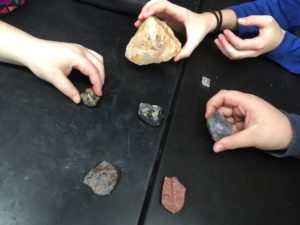
Coming back to this small school, I hoped to broaden my role beyond the classroom. I wanted to find another niche to reinforce the positives of social and emotional learning in a less structured manner. Through Whitefield’s support, I’ve developed an after school program to continue the spirit of TLS with 3rd-5th graders. In addition to meeting with every elementary grade once a week, on Mondays and Tuesdays the 3rd-5ths get the opportunity to play, build, and learn together outdoors (weather permitting). Not only do we play snow-camouflage, build forts together, and paint a mural, but we’ve had a true test of character: a snowball race!
Collaborating with the principal, we targeted the program for younger students that otherwise have no extracurricular options. We have a great turnout, about 40% of the 3rd, 4th, and 5th graders are members of the after school program (~28 students)! What’s more, a few 7th and 8th graders help me supervise the young ones. It’s invaluable to have older students fill in these roles and they do so rather naturally. Some have younger siblings and cousins, while a couple simply want to help out– a rapport at Whitefield Elementary that impresses me every day. Most every student knows one another by name, regardless of age. It’s not out of the ordinary (or “un-cool”) to see an 8th grader lend a hand to a 2nd grader. At our after school program, the 7th and 8th graders, above all other responsibilities, help younger students be honest and kind- a simple directive that, as we know, can be challenging to step up and enforce but is fundamental to effective leadership. In addition, these older students help me navigate the inevitable bumps in the road with new programming, in real time.
One day, it was far too cold to stay outside, so I planned with some of the 8th graders to create game stations in the gym. We discussed an obstacle course, where one student goes through blindfolded and must be directed by their teammates. I left the obstacle course construction up to the 8th graders, while I had to greet and gather the students. In 20 minutes, they delivered an awesomely creative course! It was filled with diverse elements and perfectly challenging for the age group. With the right students, I think integrating this type of fun obstacle course design targets creative problem solving skills that feel good to use; I plan to integrate this into our curriculum back at TLS. (I apologize to our viewers, I did not get a photo!)
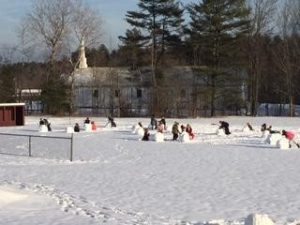
All in all, after school has been awesome. I’m very excited to report that this program should endure beyond the presence of EIR! I’ve met with a member of the UMaine’s 4H Youth Development program, who brought in some aquaponics labs, and she wants to continue running after school. We are planning to have her integrate with some of the kids and transition the winter programming into a spring theme, where the students will start to focus on working together with their school’s gardens. Most parents and students remark that they would otherwise be found sitting at home on their various devices; I’m proud to provide this simple but effective outlet.

